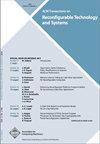VCSN: HPC FPGA集群中灵活、简单通信的虚拟电路交换网络
IF 2.8
4区 计算机科学
Q2 COMPUTER SCIENCE, HARDWARE & ARCHITECTURE
引用次数: 1
摘要
FPGA集群由于其灵活性和高功率效率,有望在不久的将来在高性能计算(HPC)系统中发挥关键作用。多个用户运行不同应用程序的大规模通用FPGA集群的操作需要灵活的网络拓扑结构进行划分和重新配置。本文提出了一种虚拟电路交换网络(VCSN),它在FPGA节点之间提供了一种可任意重构的网络拓扑和操作简单的网络系统。通过虚拟化,FPGA上的用户逻辑可以像电路交换网络一样相互通信。本文证明,采用100 Gbps以太网的VCSN由于其独特高效的通信协议,实现了FPGA之间高效的点对点通信。我们将VCSN与直接连接FPGA的直接连接网络(DCN)进行比较。我们还展示了用VCSN在FPGA集群上实现集体通信的具体过程。我们证明了VCSN提供的灵活的虚拟拓扑可以通过简单的操作加速集体通信。此外,基于实验结果,我们对DCN和VCSN在大型FPGA集群中的通信性能进行了建模和估计。结果表明,VCSN具有比DCN高1.97倍的加速聚集通信的潜力。本文章由计算机程序翻译,如有差异,请以英文原文为准。
VCSN: Virtual Circuit-Switching Network for Flexible and Simple-to-Operate Communication in HPC FPGA Cluster
FPGA clusters promise to play a critical role in high-performance computing (HPC) systems in the near future due to their flexibility and high power efficiency. The operation of large-scale general-purpose FPGA clusters on which multiple users run diverse applications requires flexible network topology to be divided and reconfigured. This paper proposes Virtual Circuit-Switching Network (VCSN) that provides an arbitrarily reconfigurable network topology and simple-to-operate network system among FPGA nodes. With virtualization, user logic on FPGAs can communicate with each other as if a circuit-switching network was available. This paper demonstrates that VCSN with 100 Gbps Ethernet achieves highly-efficient point-to-point communication among FPGAs due to its unique and efficient communication protocol. We compare VCSN with a direct connection network (DCN) that connects FPGAs directly. We also show a concrete procedure to realize collective communication on an FPGA cluster with VCSN. We demonstrate that the flexible virtual topology provided by VCSN can accelerate collective communication with simple operations. Furthermore, based on experimental results, we model and estimate communication performance by DCN and VCSN in a large FPGA cluster. The result shows that VCSN has the potential to accelerate gather communication up to about 1.97 times more than DCN.
求助全文
通过发布文献求助,成功后即可免费获取论文全文。
去求助
来源期刊

ACM Transactions on Reconfigurable Technology and Systems
COMPUTER SCIENCE, HARDWARE & ARCHITECTURE-
CiteScore
4.90
自引率
8.70%
发文量
79
审稿时长
>12 weeks
期刊介绍:
TRETS is the top journal focusing on research in, on, and with reconfigurable systems and on their underlying technology. The scope, rationale, and coverage by other journals are often limited to particular aspects of reconfigurable technology or reconfigurable systems. TRETS is a journal that covers reconfigurability in its own right.
Topics that would be appropriate for TRETS would include all levels of reconfigurable system abstractions and all aspects of reconfigurable technology including platforms, programming environments and application successes that support these systems for computing or other applications.
-The board and systems architectures of a reconfigurable platform.
-Programming environments of reconfigurable systems, especially those designed for use with reconfigurable systems that will lead to increased programmer productivity.
-Languages and compilers for reconfigurable systems.
-Logic synthesis and related tools, as they relate to reconfigurable systems.
-Applications on which success can be demonstrated.
The underlying technology from which reconfigurable systems are developed. (Currently this technology is that of FPGAs, but research on the nature and use of follow-on technologies is appropriate for TRETS.)
In considering whether a paper is suitable for TRETS, the foremost question should be whether reconfigurability has been essential to success. Topics such as architecture, programming languages, compilers, and environments, logic synthesis, and high performance applications are all suitable if the context is appropriate. For example, an architecture for an embedded application that happens to use FPGAs is not necessarily suitable for TRETS, but an architecture using FPGAs for which the reconfigurability of the FPGAs is an inherent part of the specifications (perhaps due to a need for re-use on multiple applications) would be appropriate for TRETS.
 求助内容:
求助内容: 应助结果提醒方式:
应助结果提醒方式:


